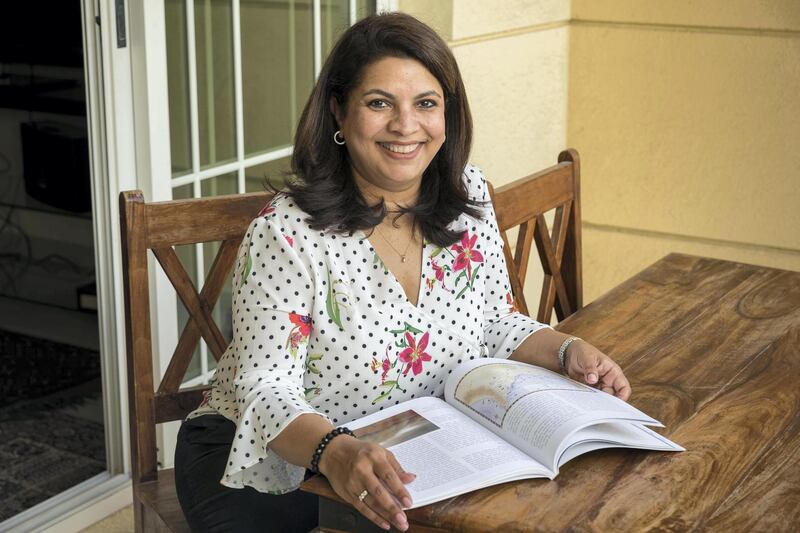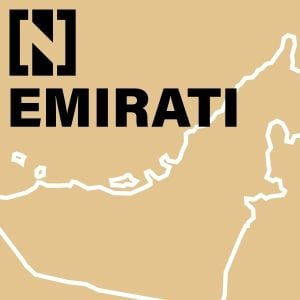Newly arrived in Dubai, Francesca Affleck wanted to know more about the country she now called home.
And like many who are curious about the culture and history of the UAE, she found the search for information as frustrating as it was intriguing.
Unlike the rest of us, the teacher turned author did something about it.
The result is Discovering the United Arab Emirates, published this weekend.
It is, as far as anyone can tell, the first English language book that explores from cover to cover every aspect of life in the UAE, from its history and geology, to the culture and customs of its people.
It is a project that goes back nearly ten years, when she was teaching nine and ten-year-olds in Dubai schools.
“I wanted the students to learn about the UAE,” she explains. All that seemed to be available was a picture story book about a pearl diver.
“I was really difficult to find something that was accessible for students to learn independently, and so I thought there's a need for a book here.”
And then she left the country.
It was 2014. She had been living in the UK for two years with her family when her British husband was offered a job back in Dubai.
"I'm quite sure it was fate that brought us back to the UAE,” she says.
“I saw the opportunity to go back to this idea of the book And I began writing.”
_____________
Read more:
Why the mystery of a murdered woman in the Emirates resurfaced after nearly 40 years
UFOs, hijackings and threats feature in 1970s book of newspaper cuttings
_____________
Four years later the book is about to go on sale. It is already generating a buzz, with a launch on Thursday at the Sheikh Mohammed Centre for Cultural Understanding, and advance orders rolling in from as far away the US.
It’s perhaps hardly surprising. The 192-page large format illustrated paperback is designed to complement everything from the official - and now mandatory - UAE social studies course, to local schools teaching the English curriculum and the International Baccalaureate.
Schools are expected to be some of the biggest customers. The launch is being held at the SMCCU in part because the centre now has a programme to introduce new teachers to the UAE.
But the appeal is much wider. Visitors, tourists, long term residents and newly arrived expats. People very much like Mrs Affleck once was, in fact.
“I showed it to people, to adults who live here, or who didn’t live here And they said things like ‘Oh if I was coming to the UAE I would like to read a book like that”, or ‘I didn’t know that’.
“So I decided to make it a book for tourists, for visitors, for residents - expatriate and local, because I would meet some Emiratis who were interested. So it’s really for everyone.”
How much did she know about the country when she started writing? “Not a lot,” she admits.
“I was literally starting out with what any expatriate family would want to know about the UAE.
She is originally from Bombay - “It was so long ago I can’t call it Mumbai” - but has lived all over the world. Her father lives in San Francisco and is about to turn 100.
“As a family we have lived overseas most of our lives. We've lived in places like Islamabad, Hong Kong, Oman.
“And everywhere we've lived we've tried to immerse ourselves in local culture as much as possible. We've tried to go out and explore, to take the children with us no matter how young they were. I’ve tried to instal that send of curiosity in the children I was teaching.”
She began by reading. And then by travelling. “We've been to every emirate, archaeological sites, remains of forts, every museum that was, although there are so many new ones. And people.”
One of the first people she sought out was Peter Hellyer, the Abu Dhabi-based writer and historian whose connection with the UAE goes back to the 1970s.
“I literally went to him with the first chapter and said ‘tell me how I go from here.’ And he did. Reading lists, people I should see. He was very kind.”
Hours of work were involved. “And hours of cross-checking. Because a lot of the history is oral history, it actually took a lot of time to make sure it was right.”
It is not the first English language book that takes the UAE as its subject. In fact there are dozens of them, some now long out of print.
There are accounts of archaeological expeditions, studies of fauna and flora, photographic collections and numerous memoirs, from old soldiers and diplomats to oil men and childhood experiences.
Oddly though, not one of them tells the story of life here between two covers. “I’m really not sure why,” she says.
“It was very difficult to get all the information and I suppose coming back to Dubai this time I made the time to go and find out for myself.”
She took the proposal to Medina, an international publishing house with offices in Ras al Khaimah, who accepted it almost immediately. The book was finished by early last summer and seemed set for publication in time for the Autumn.
There was one final hurdle. Approval to sell locally by the National Media Council, the government body that issues permits. Three months went by.
“I didn’t hear anything until November when they came back with a few suggestions. There was nothing onerous at all.”
Mostly she says, it was correcting protocol for the sheikhs and establishing the spelling of local family names.
“They were very thorough and clearly went through the whole book, and I was very happy to make those changes.”
Amended, the book went back to the NMC again.
“On December 26, I was in the queue at the Louvre Abu Dhabi and I got a message saying it was approved. I was so happy, because it had been a long time.”
She is already thinking about a revised edition for 2020 and translations in Arabic, and other languages that would appeal to tourists.
“For me, one of the main reasons for writing this was to be able to share it,” she says.
“That’s why I wrote it. So people can say ‘now I know’."







